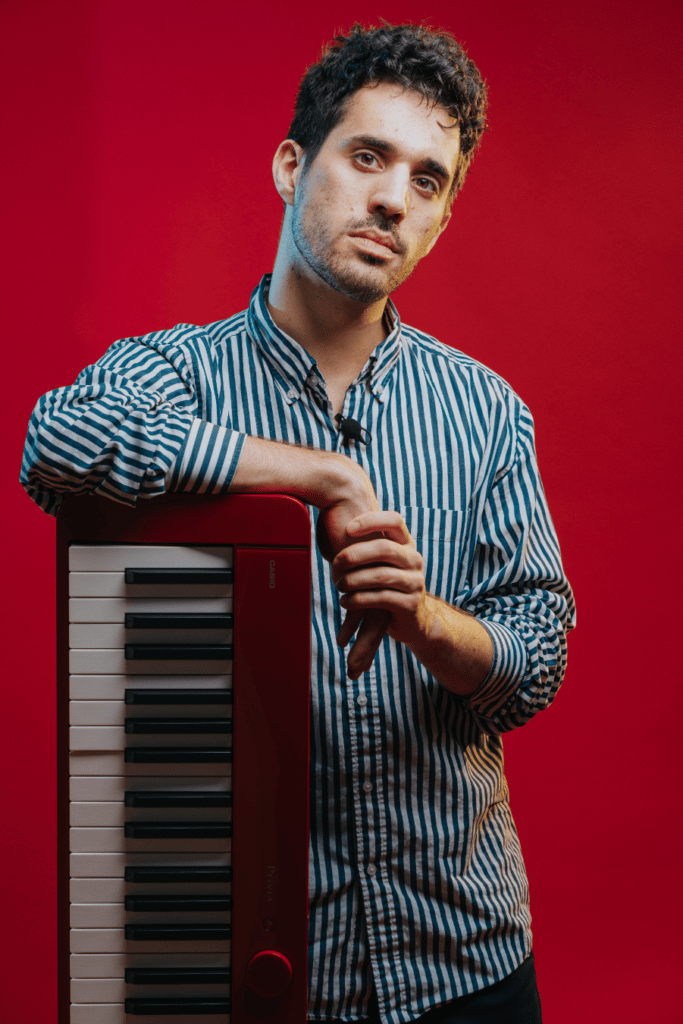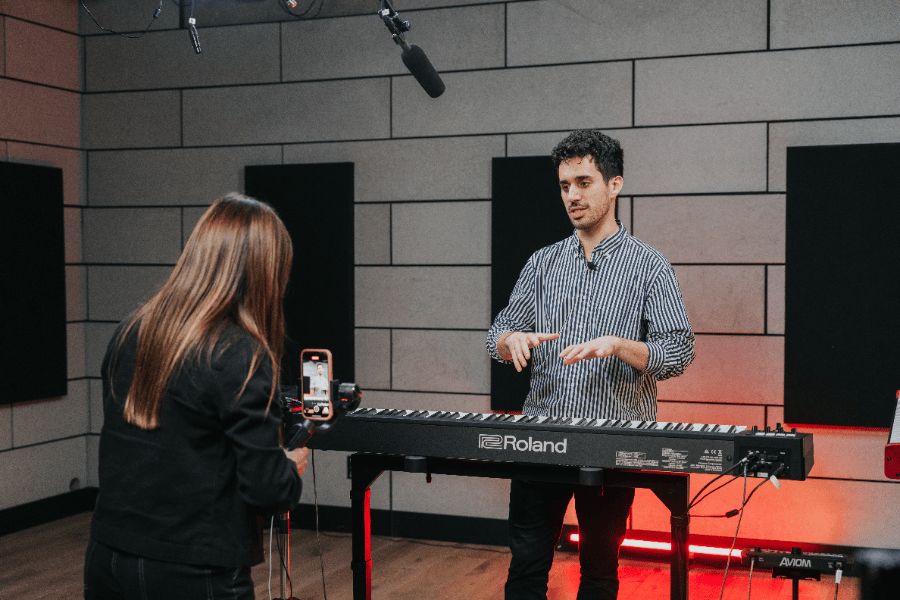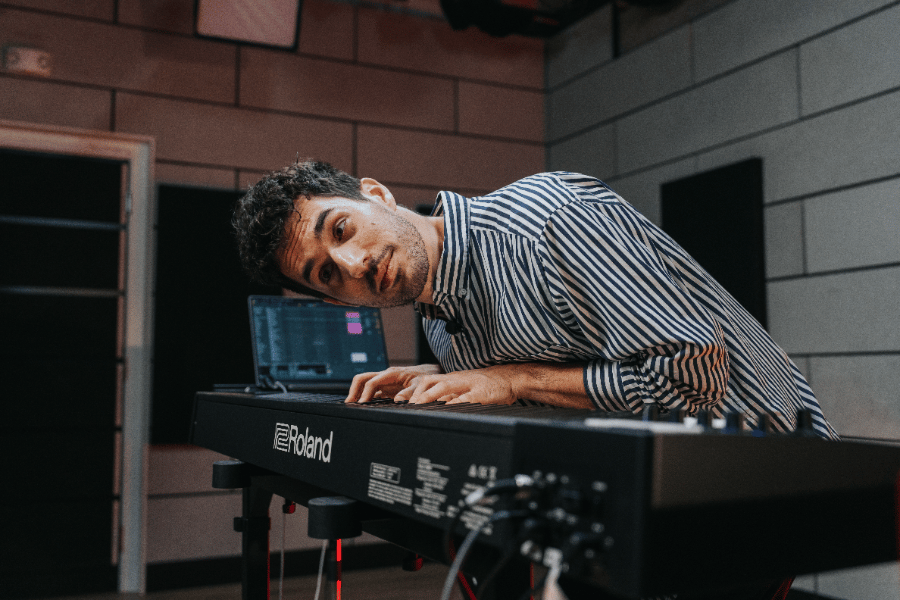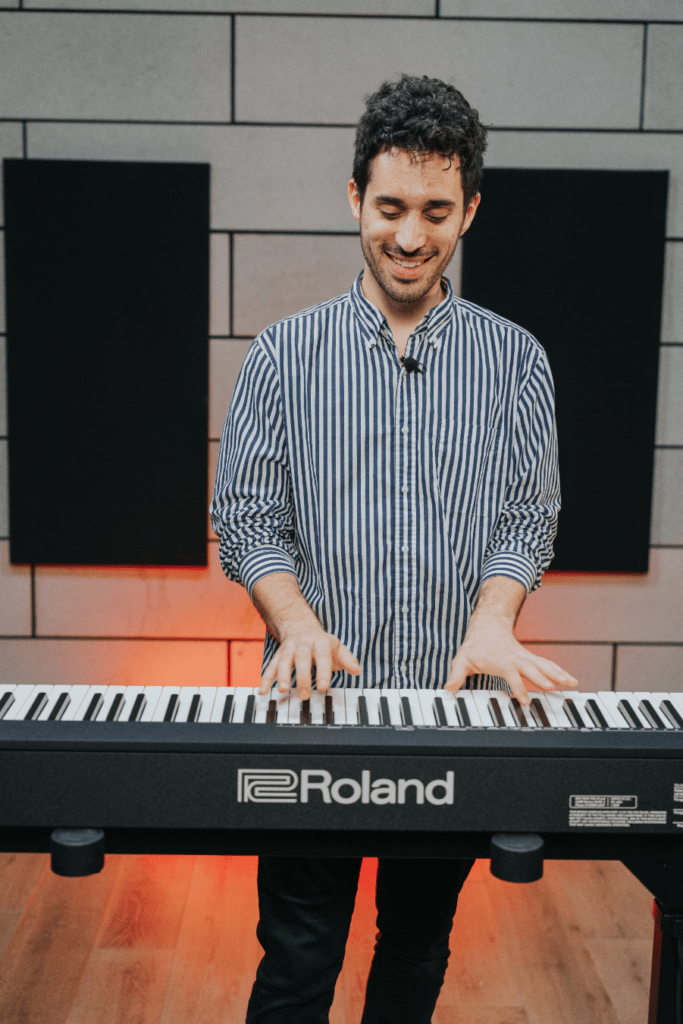It’s a common enough story: you want to learn piano, so you go looking for teachers. Or maybe your parents did. And they found classical piano teachers. So naturally, you end up following a classical piano path.
But today, even if you start with classical music, you can choose your own adventure. You can discover your sound and expression in jazz, hip hop, electronic music, and even production.
All it takes is an open mind. And maybe a little guidance. To help you along, I sat down with Nicholas Dupuis, the classically trained keyboardist and producer behind Anomalie. Here is our chat, edited for length and clarity.
Table of Contents:
Get exclusive interviews, fascinating articles, and inspiring lessons delivered straight to your inbox.
Hello! My name is Nico. I’m a keyboardist and producer and I’ve released albums under the name or moniker “Anomalie”. I am from Montreal, Canada. I’m a French-Canadian.
Mainly, I wanted a name that was spelled in French to present some kind of Montreal identity. I also wanted it to be a word that’s found in other languages.
I love the city. Very, very much. I think it is very active, culturally. Just to start off, there’s the bilingual nature which creates a unique dynamic in North America.

But there’s also so many festivals. The Jazz Festival on its own is just such an institution and it kind of represents the city internationally on a cultural level as well. It has grown so much since it was first created.
There’s also a duality to the Montreal scene. On one hand, the city is often included in the touring cycle of international artists, and on the other you have this bubble of francophone artists who sometimes export what they do to other French-speaking countries and sometimes transcend the barriers of language, but it’s pretty rare.
Add to that the underground scenes in Montreal and you get this combination that is like a breeding ground for really cool creativity and different styles are born from that.
I grew up in an environment that really favored falling in love with music. I was fortunate to be born into a very musical family. My dad is now retired for a while, but for most of his life he was a radio host focused on mostly classical music. My mom is a piano and music theory teacher. For some people, being raised in that environment can push them away from music, but in my case it really pulled me to it.
I’ve been playing piano since I was a kid. I began in the classical world and, in my teens, pivoted toward electronic music with GarageBand. And then jazz came afterwards where I got introduced to Herbie Hancock and Chick Corea and other pioneers of the jazz fusion world where synthesizers are used.
Discovering that scene and hip-hop is how the early stages of Anomalie was born.
A lot of what I learned about music production and sound design was self-taught. To this day, it’s just trial and error and trying to find my own taste for things.
It’s the most important aspect of creation in general: going toward things that appeal to your own sense of taste, which you develop through both creating and actively listening.
And a lot of my early stuff was just, like, objectively not very good.
But I kept making more and more, and got more acquainted with several features of the DAW I was using. As I went, I combined this with some of the stuff I was exploring on the piano.
I got acquainted with new repertoire, watched YouTube tutorials, saw how others worked, and learned from actually producing.
I went to school for Jazz Performance. In Quebec, we have something called CÉGEP, which is between high school and university. So I did a three year program at Cégep de Saint-Laurent with an amazing teacher called Lorraine Desmarais, who is an incredible jazz pianist. I owe so much to her in terms of jazz piano.
And growing up, my piano teacher’s name was Yolande Gaudreault, who is a legend. She has a school in the southwest part of the Island of Montreal and a lot of the career classical pianists that are doing really well also studied with her. I went a different path with production and a jazz-leaning angle, but I owe so much to her, too.

Yeah! I got the idea from an amazing Prog guitar player from Australia called Plini. He does something like it, too.
It’s part of a VIP package. A lot of artists that tour, especially those like me who are in the mid-tier of venue capacity, offer VIP packages. You pay a certain amount and get access to soundcheck, or get to do a Q&A with artists, which is awesome.
But when I thought about my audience, a significant percentage of them happen to be musicians on a lot of different levels, so I felt it made sense to do an actual masterclass or group lesson.
I share my approach to arrangement, harmony and production. In the earlier years, there was a portion on production as well, but because I only had an hour, I would end up speaking very quickly to cover a lot of ground.
In the last two years, my masterclasses have focused mostly on harmony and reharmonization. I also dedicate a portion of the time to giving people a chance to guide the masterclass in a certain direction if there’s a question that pops up.
It’s awesome, because even though there’s prepared material that stays consistent throughout the tours, sometimes the class will go into completely new directions.
It is! It’s just such a great way to connect with people who have similar interests and to share some knowledge and be enthusiastic about music and music theory. So it’s really cool.
I think it definitely facilitates a lot of things. I’m very biased. I would encourage everyone to learn it.
It’s an incredible tool to help navigate music-related things. Like, learning harmony through this instrument is what everyone does at some point because you can very easily visualize concepts and apply them in a concrete way. And for production, it’s such a cool medium to explore other types of sounds.

Nice!
Totally.
When I think back to moving from classical to jazz I remember feeling almost dizzy as I tried to find my way.
I would say first, take things one step at a time. One of the first things my jazz teacher taught me was that you build your musical vocab through active listening and spotting specific patterns or motifs that a player often uses. Remember that everything that comes out instinctively is something that, at some point, you consciously or unconsciously integrated and took time to practice.
Another part is taking the time to learn different motifs like little blues licks, the blues scale, certain chord progressions, different ways to voice all of those chords starting with a blues structure — like two chords or three in the 12- or 16-bar form.
These are things you’re still getting from sheet music, so it’s a transition that feels natural.
Eventually, you get away from sheet music and just look at your instrument and apply what you’ve heard and learned in all keys, different contexts, making connections, linking different patterns together, coming up with your own variations. And then, at a certain point, your ear is trained enough to be able to transcribe.
I think it’s an incredibly important goal. Once you get to that point where you’re able to transcribe repertoire that you personally selected, you’ll have an endless amount of vocab you can learn for the rest of your life.
You could transcribe a solo and play it as-is, or isolate specific licks or moments you’re interested in and make exercises out of them. It’s powerful.
Begin by transcribing monophonic instruments. Like a sax solo, a clarinet solo or a trumpet solo. You’re focusing on melody. There are fewer parameters and you can slow it down and just play with your right hand. You can build from there.
Get familiarized with the feel or color of a certain chord. A great exercise is to record a bunch of different major and minor triads in quick succession over different notes. So, maybe a series of 20 or 30. Then you randomize the order, play them back, and identify them. Add more chord options or inversions as you progress. It makes you more efficient to analyze how a certain chord feels as opposed to identifying the individual voices.
That’s a very big question. Unfortunately, I don’t have a definitive answer because there are so many different paths possible today.
I feel grateful because Yolande, my teacher as a young musician, was anchored in classical music but had an open mind and allowed for expressiveness and deviating a little.
I think open-mindedness is an important factor. There’s a place for purists because they have the role of preserving, in some cases, historic accuracy or a certain school of thought.
But being open-minded breeds hybrids and variations of different schools of thought.
Yeah, people can view piano as a monotonous instrument in some ways because it’s percussive. Once you’ve played a note, it kind of slowly dies off and yeah, that’s the end of it.
That’s super interesting! Yeah, you can’t really add expression on a single note. Not directly, at least. Synths are pretty great for pianos in that sense, where you can mimic what is being done with the human voice and wind instruments. These traditionally have more expression.

But even on a real instrument, there’s playing with a damper pedal. Or playing with felt on a piano so everything kind of feels muffled. These are such interesting ways to drastically alter your timbre in a creative way.
There’s also the different range of dynamics you get depending on the kind of instrument you’re using, like a cheap upright or a more expensive upright, or a grand piano which has double escapement.
That has a lot to do with expressiveness and timbre. And because we have two hands, we can play different lines or voices at the same time on the piano, choosing to prioritize a certain inner voice or top line, or the bass movement — that decision alone is such an important factor in timbre and expressiveness.
But even on a real instrument, there’s playing with a damper pedal. Or playing with felt on a piano so everything kind of feels muffled. These are such interesting ways to drastically alter your timbre in a creative way.
There’s also the different range of dynamics you get depending on the kind of instrument you’re using, like a cheap upright or a more expensive upright, or a grand piano which has double escapement.
That has a lot to do with expressiveness and timbre. And because we have two hands, we can play different lines or voices at the same time on the piano, choosing to prioritize a certain inner voice or top line, or the bass movement — that decision alone is such an important factor in timbre and expressiveness.
There’s also playing around within the context of a certain phrase: determining—either in advance like in a written piece or in an improvised solo—where you are headed. For example, is there a gradual crescendo headed toward a certain point in your phrase? Or maybe a change in nuance throughout the phrase, going up and down not only in dynamics, but also playing around with tempo. Playing with rushing and dragging.
Oh, and repeated notes as well. By default, you play a note and it kind of dies off. So, whether on the same note or an octave that just doubles, while repeating the note you can make it super percussive by playing around with rushing and dragging. Or kind of mimicking what a wind player would do with a sustain note that goes up and down in volume, you can do that with a repeated note or octave. They’re all cool avenues to explore.
Oh yeah, it’s a world of difference. As you say, you can get obsessed with, like, kind of thinking horizontally. Trying to achieve speed or expressiveness through that. But a repeated note can be as, if not more, efficient in certain ways or contexts.
In March, we did our last tour of the two year-ish cycle off the previous album.
So I took the last two and a half months to really go into hermit mode and try to reconnect with practice and writing. Over the summer and potentially some of the autumn as well, I’ll be focusing on writing the next chapters, the next project.
That’s going super well, and when it eventually comes out, we’ll get back together with the band and do another touring cycle. And that’s the way it goes!
Thank you so much for having me.
The best way to learn piano is with real teachers, but not everyone has the time and money for a private instructor. At Pianote, you can get real feedback from real experts…all from the comfort of your own home. Explore our Method and community yourself with a free 7-day trial.
TRY PIANOTE FOR 7 DAYSCharmaine Li is a Vancouver writer who has played piano for over 20 years. She holds an Associate diploma (ARCT) from the Royal Conservatory of Music and loves writing about the ways in which music—and music learning—affects the human experience. Charmaine manages The Note. Learn more about Charmaine here.


By signing up you’ll also receive our ongoing free lessons and special offers. Don’t worry, we value your privacy and you can unsubscribe at any time.
We use cookies for traffic data and advertising. Cookie Policy »